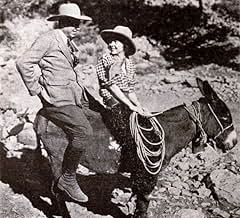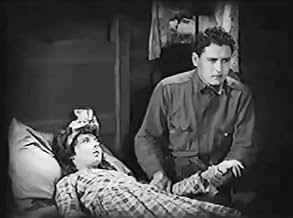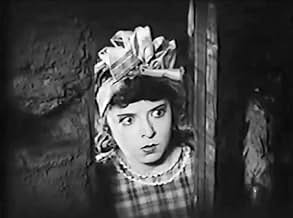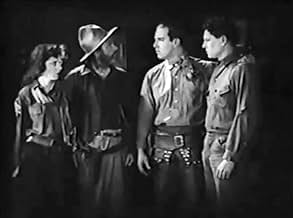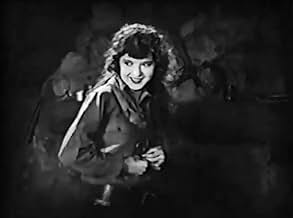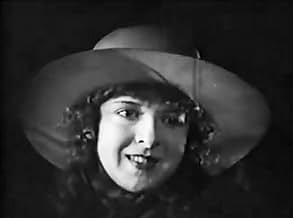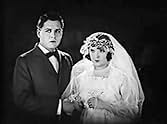The sky pilot is a preacher who helps Gwen walk again after a near-fatal accident.The sky pilot is a preacher who helps Gwen walk again after a near-fatal accident.The sky pilot is a preacher who helps Gwen walk again after a near-fatal accident.
6.1197
1
2
3
4
5
6
7
8
9
10
Featured reviews
Not My Kind of Movie
What is a Sky Pilot? That's a nickname for a preacher. John Bowers stars as a missionary to a rural area filled with rough cowboys who mock religion. He has trouble converting the area, aside from one friend and a beautiful girl (Colleen Moore) that he falls in love with.
For the most part, nothing much happens in this film. It is short, but hardly sweet. There is a lot of time spent waiting for the characters to do something. The romantic relationship is hardly developed, and the real attraction to this movie, Moore, is barely in the movie.
If you like westerns or early, somewhat primitive films, this one is for you. If you're a Moore collector, grab this one, but don't stress over it. It probably will never be a favorite.
For the most part, nothing much happens in this film. It is short, but hardly sweet. There is a lot of time spent waiting for the characters to do something. The romantic relationship is hardly developed, and the real attraction to this movie, Moore, is barely in the movie.
If you like westerns or early, somewhat primitive films, this one is for you. If you're a Moore collector, grab this one, but don't stress over it. It probably will never be a favorite.
God Gets Subtext
The tiny western settlement of "Swan Creek" is assigned a preacher from Montreal, idealistic John Bowers (as Arthur Wellington Moore). He arrives on a dry day, with an open umbrella and a mule. Since the Godless community has no place to worship, Mr. Bowers sets up his first sermon at the local watering-hole. In the saloon, Bowers meets rowdy ranch foreman David Butler (as Bill Hendricks). The men have a wild brawl and wind up wrestling on the floor. It turns out to be classic male-bonding. Afterwards, Bowers gently wipes the blood from Mr. Hendricks' cheek and all is forgiven...
Shortly thereafter, when Hendricks cradles Bowers head after taking him to bed, you wonder what is going on between the men; director King Vidor shoots this like it's a love scene. The men look like they're about to kiss. Probably, they're just dealing with some latent issues. Both also seem attracted to pretty Colleen Moore (as Gwen). Sporting her pre-flapper Mary Pickford hair, Ms. Moore is the most fetching female on film. She suffers a mishap, but Christian love may provide a cure...
For those unfamiliar with the old titular term, or the 1968 anti-war anthem "Sky Pilot" by Eric Burdon & the Animals, "The Sky Pilot" is a minister who provides guidance for your trip to heaven. This film has a good lead with Bowers, and Mr. Vidor ramps it up with interesting direction and good-looking production values. Moore is sweet, but Butler steals the performance honors as second lead. Oddly enough, it looks like Bowers would rather be with Butler than Moore. Bowers' final scene with Moore reveals he's not at all satisfied with his partner. Just look at that man's confused and wary face...
******* The Sky Pilot (4/17/21) King Vidor ~ John Bowers, David Butler, Colleen Moore, Harry Todd
Shortly thereafter, when Hendricks cradles Bowers head after taking him to bed, you wonder what is going on between the men; director King Vidor shoots this like it's a love scene. The men look like they're about to kiss. Probably, they're just dealing with some latent issues. Both also seem attracted to pretty Colleen Moore (as Gwen). Sporting her pre-flapper Mary Pickford hair, Ms. Moore is the most fetching female on film. She suffers a mishap, but Christian love may provide a cure...
For those unfamiliar with the old titular term, or the 1968 anti-war anthem "Sky Pilot" by Eric Burdon & the Animals, "The Sky Pilot" is a minister who provides guidance for your trip to heaven. This film has a good lead with Bowers, and Mr. Vidor ramps it up with interesting direction and good-looking production values. Moore is sweet, but Butler steals the performance honors as second lead. Oddly enough, it looks like Bowers would rather be with Butler than Moore. Bowers' final scene with Moore reveals he's not at all satisfied with his partner. Just look at that man's confused and wary face...
******* The Sky Pilot (4/17/21) King Vidor ~ John Bowers, David Butler, Colleen Moore, Harry Todd
The King's Last Movie at Vidor Village
Young director King Vidor knew he had a great gig in his working relationship with First National Pictures. The company, impressed by Vidor's earlier movies, hired him in late 1919 and funded his very own production studio in Santa Monica, California, naming it 'Vidor Village.' His April 1921 "Sky Pilot," starring Colleen Moore, was a culmination of small, yet successful movies that were made mostly inside his cozy studio building. But to film "Sky Pilot," a picture about a minister who arrives at a hostile Western town to begin a church, required shooting in the High Sierra mountains.
The movie proved to be much more expensive than Vidor's other projects, causing studio executives to raise their eyebrows. When the cost overruns ate into its profits, First National decided to cut ties with the director. Vidor became a free-lancer once again. But the studio's severance didn't stop what turned out to be one of the longest Hollywood careers in history. Vidor directed movies for 67 years, was nominated for the Academy Awards five times, and received an honorary Oscar for his body of work.
Named after his uncle, King Wallis, the Galveston, Texas, 1894-born lad witnessed the 1900 destructive Galveston Hurricane, destroying much of the town. He later put his memory of the storm to good use when he directed the tornado scene with Dorothy and Toto in 1939's 'The Wizard of Oz.' King was given a heavy dose of Christian Science religion by his mother early on, a faith that touched many of his movies. At 18, after working for a Houston, Texas film production company, he headed out to California with his newlywed, actress Florence Cobb Vidor. While Vitagraph Studio hired the two in 1916 to act, King's passion was scriptwriting and directing. After directing a moralistic film series, he gathered ten doctors to finance his first feature movie, 1919's 'The Turn in the Road.' An instant financial success, the movie's tidy profit gave the doctors the impetus to form a film production company backed by young Vidor's directorship.
The movie proved to be much more expensive than Vidor's other projects, causing studio executives to raise their eyebrows. When the cost overruns ate into its profits, First National decided to cut ties with the director. Vidor became a free-lancer once again. But the studio's severance didn't stop what turned out to be one of the longest Hollywood careers in history. Vidor directed movies for 67 years, was nominated for the Academy Awards five times, and received an honorary Oscar for his body of work.
Named after his uncle, King Wallis, the Galveston, Texas, 1894-born lad witnessed the 1900 destructive Galveston Hurricane, destroying much of the town. He later put his memory of the storm to good use when he directed the tornado scene with Dorothy and Toto in 1939's 'The Wizard of Oz.' King was given a heavy dose of Christian Science religion by his mother early on, a faith that touched many of his movies. At 18, after working for a Houston, Texas film production company, he headed out to California with his newlywed, actress Florence Cobb Vidor. While Vitagraph Studio hired the two in 1916 to act, King's passion was scriptwriting and directing. After directing a moralistic film series, he gathered ten doctors to finance his first feature movie, 1919's 'The Turn in the Road.' An instant financial success, the movie's tidy profit gave the doctors the impetus to form a film production company backed by young Vidor's directorship.
Enjoyable and well-made, even with some rough edges
Even at their most middling and unremarkable there's something rich and endearing about silent films in their earnestness, and about the old techniques of film-making and storytelling without sound. It's been said, often with an air of cynicism, that the era represents "simpler entertainment for a simpler time," and sometimes that does quite come across - especially when, as here, we get at least in part an expression of cultural values (e.g., introducing religion to a frontier town) that are decidedly outdated. The fact that the name of this picture refers to the protagonist and his role as a preacher ("conveying his congregation to the heavens," as it were) kind of says it all. Yet through any measure of kitsch, any comparative lack of sophistication, some rough edges, and image quality that has somewhat diminished over time, 'The Sky Pilot' remains an enjoyable, well made feature. As a work in the long career of King Vidor, as a western, or just as something good to watch, there's much to appreciate here, and all the utmost skepticism doesn't take away from the core value.
In the broad strokes the plot is fairly light, and not super noteworthy: a young preacher coming to town, finding conflict and gradual acceptance, and getting involved in other goings-on. The plot development and editing are stilted and brusque at points, shortchanging the actual story and doing the whole no favors; as a few examples among others, look to how abruptly the relationship between the protagonist and Hendricks changes, the manner in which characters are introduced, or a crucial scene involving Gwen a bit more than halfway through. Still, even for all this the tale is a worthy good time in and of itself. Between Ralph Connor's novel and Faith Green and John McDermott's adaptation for the screen there is a solid foundation in the overall saga, and in the scenes and characters. If in execution the viewing experience becomes a tad choppy and oversimplified, well, that comes with the territory every now and again, even one hundred years on. Meanwhile, though not one of Vidor's premier movies, his direction is firmly capable, and we can readily discern the ardor of the production. From beautiful filming locations, sets, and costume design, to complex stunts and effects, and even down to just the regular orchestration of every shot and scene, any self-respecting cinephile will see a great deal to admire in most every facet. If you love the medium, and the art of film-making, this is a minor treasure.
True, 'The Sky Pilot' is unlikely to change the minds of anyone who isn't already enamored of the silent era; there is just enough clunky unwieldiness in the presentation that I can understand how it won't appeal to some modern viewers. Case in point: nevermind the most hokey, laughable facets of the religious messaging, at large the dialogue as imparted through intertitles is less than great; the last reel or so lags in places, and maybe isn't the strongest portion of the runtime. Yet the cast are a small joy, certainly including John Bowers and Colleen Moore, even if the curtness of the plot development and editing mean that their commendable performances are at times rendered somewhat perfunctory. We do get sequences of grand adventure and high drama as we would anticipate of a western, and these are as excellent as most any to greet us in the genre; the protagonist may be a preacher, but strictly speaking faith isn't altogether the centerpiece, just significant flavoring. L. William O'Connell and Gus Peterson's cinematography is smart and superb, making a considerable impression in the bigger outdoors sequences where a more active, calculated eye is required; even some instances of lighting are choice. It bears repeating that the stunts and effects herein are pretty fantastic, a fine credit to all involved. All told the title may not be a revelation, nor a must-see, but if one is receptive to older cinema and has the opportunity to watch, it's very entertaining, and deserving on its own merits.
Don't go out of your way for this flick, and be very cognizant of the stylistic and narrative decisions by which it falls short (especially in retrospect). The roots are very sturdy, however, so if you do have the chance to watch, and not least if you're the type of person who loves films even just for their craftsmanship, then these are seventy-five minutes well spent.
In the broad strokes the plot is fairly light, and not super noteworthy: a young preacher coming to town, finding conflict and gradual acceptance, and getting involved in other goings-on. The plot development and editing are stilted and brusque at points, shortchanging the actual story and doing the whole no favors; as a few examples among others, look to how abruptly the relationship between the protagonist and Hendricks changes, the manner in which characters are introduced, or a crucial scene involving Gwen a bit more than halfway through. Still, even for all this the tale is a worthy good time in and of itself. Between Ralph Connor's novel and Faith Green and John McDermott's adaptation for the screen there is a solid foundation in the overall saga, and in the scenes and characters. If in execution the viewing experience becomes a tad choppy and oversimplified, well, that comes with the territory every now and again, even one hundred years on. Meanwhile, though not one of Vidor's premier movies, his direction is firmly capable, and we can readily discern the ardor of the production. From beautiful filming locations, sets, and costume design, to complex stunts and effects, and even down to just the regular orchestration of every shot and scene, any self-respecting cinephile will see a great deal to admire in most every facet. If you love the medium, and the art of film-making, this is a minor treasure.
True, 'The Sky Pilot' is unlikely to change the minds of anyone who isn't already enamored of the silent era; there is just enough clunky unwieldiness in the presentation that I can understand how it won't appeal to some modern viewers. Case in point: nevermind the most hokey, laughable facets of the religious messaging, at large the dialogue as imparted through intertitles is less than great; the last reel or so lags in places, and maybe isn't the strongest portion of the runtime. Yet the cast are a small joy, certainly including John Bowers and Colleen Moore, even if the curtness of the plot development and editing mean that their commendable performances are at times rendered somewhat perfunctory. We do get sequences of grand adventure and high drama as we would anticipate of a western, and these are as excellent as most any to greet us in the genre; the protagonist may be a preacher, but strictly speaking faith isn't altogether the centerpiece, just significant flavoring. L. William O'Connell and Gus Peterson's cinematography is smart and superb, making a considerable impression in the bigger outdoors sequences where a more active, calculated eye is required; even some instances of lighting are choice. It bears repeating that the stunts and effects herein are pretty fantastic, a fine credit to all involved. All told the title may not be a revelation, nor a must-see, but if one is receptive to older cinema and has the opportunity to watch, it's very entertaining, and deserving on its own merits.
Don't go out of your way for this flick, and be very cognizant of the stylistic and narrative decisions by which it falls short (especially in retrospect). The roots are very sturdy, however, so if you do have the chance to watch, and not least if you're the type of person who loves films even just for their craftsmanship, then these are seventy-five minutes well spent.
Martyrs of the Northwest
Heavy-handed but well-mounted, this early King Vidor film would have us believe that all that is needed to bring Christianity to cattle rustlers is to win their respect. Vidor mixes sentimentality and excitement a little ham-handedly, as when Colleen Moore regains the use of her legs so she can drag the unconscious John Bowers from the burning church. On the other hand, some of the scenes -- as when John Bowers stands off a herd of stampeding cattle so they won't trample the obvious dummy standing in for Colleen Moore stand up very well. David Butler, later to be a major director of musical comedies, has the second lead and Miss Moore never looked lovelier.
Did you know
- TriviaDavid Butler, who plays ranch foreman Bill Hendricks, went on to direct 92 movies and tv shows - including Shirley Temple films, the Hope/Crosby film Road to Morocco, some musicals (like Calamity Jane) and over 50 episodes of Leave It to Beaver.
- ConnectionsFeatured in Dreamland: A History of Early Canadian Movies 1895-1939 (1974)
Details
- Runtime
- 1h 17m(77 min)
- Color
- Sound mix
- Aspect ratio
- 1.33 : 1
Contribute to this page
Suggest an edit or add missing content

